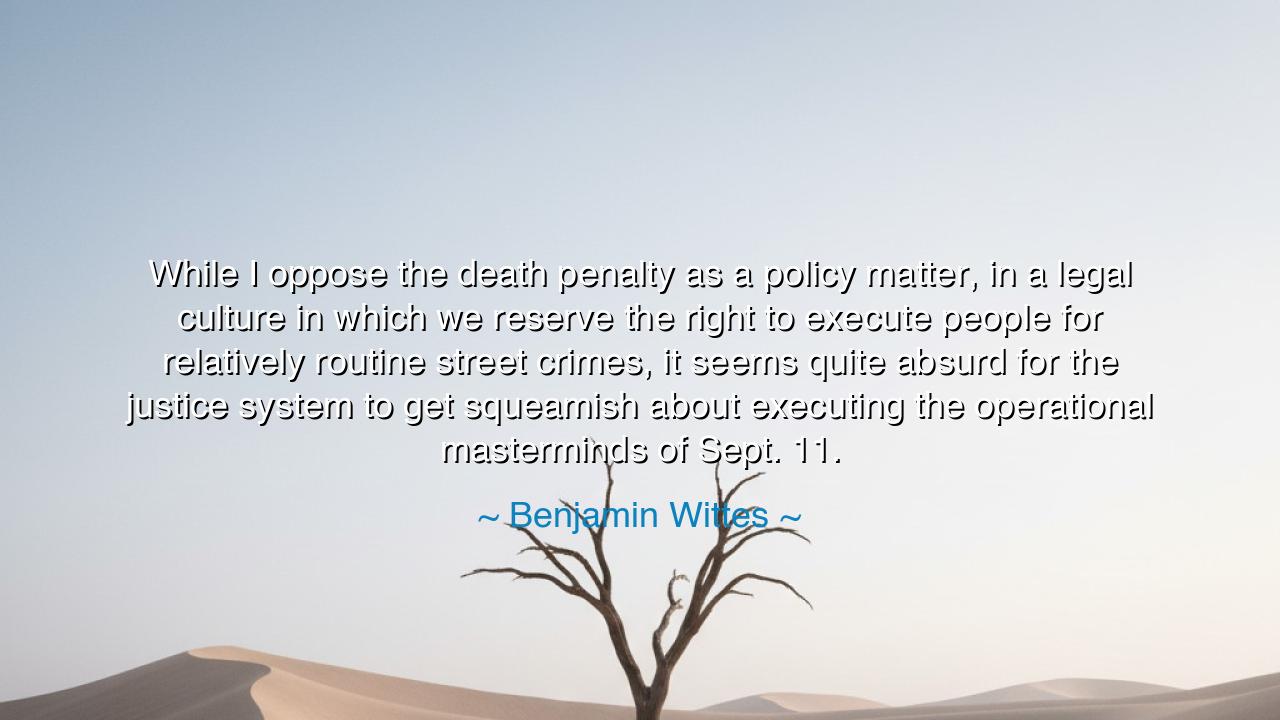
While I oppose the death penalty as a policy matter, in a legal
While I oppose the death penalty as a policy matter, in a legal culture in which we reserve the right to execute people for relatively routine street crimes, it seems quite absurd for the justice system to get squeamish about executing the operational masterminds of Sept. 11.






When Benjamin Wittes declared, “While I oppose the death penalty as a policy matter, in a legal culture in which we reserve the right to execute people for relatively routine street crimes, it seems quite absurd for the justice system to get squeamish about executing the operational masterminds of Sept. 11,” he did not speak as one reveling in vengeance, but as a philosopher confronting the hypocrisy of power. His words burn with moral irony — a challenge to the inconsistency of justice itself. He reminds us that a nation cannot claim moral high ground while wielding its harshest punishments carelessly, then hesitating when true evil stands before it. This is not a call for blood, but a call for coherence — that law must be guided by reason, not sentiment, and that the scales of justice must weigh all crimes with clarity, not convenience.
In the style of the ancients, Wittes speaks as one who has walked the battlefield of ethics, torn between mercy and judgment. He confesses opposition to the death penalty, yet he wields logic like a sword against hypocrisy. His argument is simple, yet profound: if a society claims the moral right to execute its citizens for lesser crimes — for the spilling of blood in alleyways, for murders born of anger or despair — how can it tremble when faced with those whose actions brought nations to mourning and towers to ash? He forces his listeners to confront a truth many fear: that justice without consistency is corruption in disguise, and that moral hesitation, when selective, becomes cowardice masquerading as virtue.
The origin of this quote lies in Wittes’s writings on national security, justice, and ethics in the aftermath of September 11, 2001. A legal scholar and commentator, Wittes sought to explore the contradictions in America’s approach to punishment — how the same system that casually condemned men to death in state courts seemed paralyzed when facing the architects of one of the gravest atrocities in modern history. His words expose the tension between moral conviction and political restraint, between the law’s cold precision and the human heart’s longing for meaning. He does not celebrate execution, but he demands honesty — that a nation must not hide behind sentiment when its own hands are already stained by the weight of its own laws.
History offers many mirrors to Wittes’s reasoning. Consider Rome, that ancient empire of law and order. When traitors conspired against the republic, Cicero — a man who loved peace — nonetheless demanded their execution, saying that the state which cannot punish treason is already dead in spirit. Yet Rome, in its twilight years, grew decadent and inconsistent, sparing tyrants while slaughtering the poor. Its justice became spectacle rather than virtue, and in that inconsistency lay its downfall. Wittes’s warning echoes through time: a society that enforces punishment unevenly, guided by emotion rather than principle, will lose both its moral authority and its soul.
But his words also pierce deeper, into the heart of human conscience. To oppose the death penalty — as Wittes himself does — is to believe that no state should claim the power to take a life. Yet, to oppose it blindly, without recognizing the grotesque imbalance in its use, is to abandon logic and truth. The ancients would have understood this as the tension between justice and mercy, between logos and pathos — the eternal battle within the soul of civilization. For the law must be both humane and honest, and when it becomes timid in the face of true evil while remaining merciless to the small and the weak, it ceases to be law at all.
Wittes’s statement, then, is not about death — it is about moral integrity. It calls upon every society to look inward and ask: do our punishments reflect our values, or merely our fears? If we can execute the thief but hesitate before the tyrant, we have inverted the natural order of justice. If we cry for mercy when evil shows its face, but deny compassion to the desperate and forgotten, then our justice is a mask for moral confusion. The wise of every age have warned against this imbalance — from Confucius, who taught that order depends on consistency, to Aristotle, who saw justice as the harmony of reason and virtue.
The lesson of Wittes’s words is as timeless as it is uncomfortable: do not hide moral cowardice behind moral principle. Whether in the courts of law or the chambers of conscience, let consistency guide judgment. If one opposes the death penalty, oppose it always; if one accepts it, apply it justly, without regard to politics or public passion. A civilization’s strength lies not in the ferocity of its punishments, but in the clarity of its convictions. To waver in principle when faced with evil is to betray both justice and mercy.
So let these words be remembered not as a defense of execution, but as a call for honesty in justice. The wise ruler, the noble judge, and the thoughtful citizen must ask themselves: do I act from truth, or from fear? Do my principles hold firm when tested by outrage? For justice that bends to circumstance ceases to be justice at all. Let the future learn from this — that a society must either wield its laws with unwavering fairness, or have the courage to cast them aside and begin anew. Only then can it claim, with integrity, to stand for righteousness rather than retribution.






AAdministratorAdministrator
Welcome, honored guests. Please leave a comment, we will respond soon